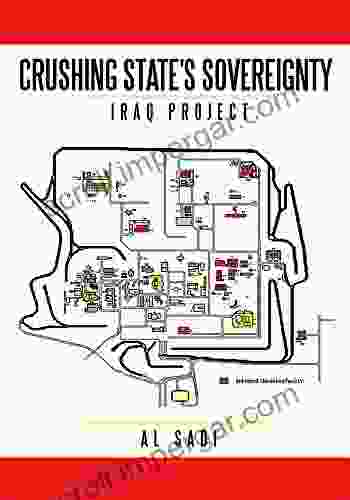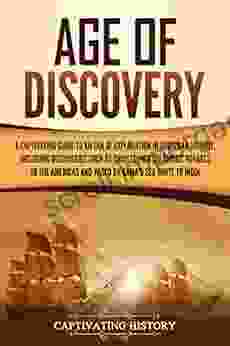Crushing State Sovereignty: The Iraq Project and Its Global Impact

The Genesis of the Iraq Project
The Iraq Project, a controversial military intervention launched in 2003, had its roots in a complex interplay of factors. In the wake of the September 11th attacks, the United States and its allies embarked on a global campaign against terrorism. Iraq, led by Saddam Hussein, was perceived as a threat due to its alleged possession of weapons of mass destruction and its support for anti-Western groups.
However, the decision to invade Iraq was highly contentious. Critics argued that there was no clear evidence of an imminent threat from Iraq and that the invasion would destabilize the region. Despite these concerns, the United States and its allies, including the United Kingdom, Australia, and Poland, launched a military campaign that began on March 20, 2003.
4 out of 5
| Language | : | English |
| File size | : | 1584 KB |
| Text-to-Speech | : | Enabled |
| Screen Reader | : | Supported |
| Enhanced typesetting | : | Enabled |
| Word Wise | : | Enabled |
| Print length | : | 258 pages |
The Execution and Consequences of the Iraq Project
The Iraq Project had a profound impact on Iraq itself. The invasion led to the overthrow of Saddam Hussein's regime and the establishment of a new Iraqi government. However, the war also resulted in widespread violence and instability, which continue to plague the country today. The United States and its allies also faced significant challenges in stabilizing Iraq and rebuilding its infrastructure.
Beyond Iraq, the Iraq Project had a major impact on the global Free Download. The invasion raised questions about the role of the United Nations in international affairs and the use of force by states. It also led to a decline in trust between the United States and its allies, as well as a rise in anti-Western sentiment in the Middle East.
The State Sovereignty Implications
One of the most significant consequences of the Iraq Project was its impact on state sovereignty. The principle of state sovereignty has long been a cornerstone of international law, recognizing the right of each state to govern its own affairs without external interference. However, the Iraq Project raised questions about the limits of state sovereignty in the face of global threats.
The United States and its allies argued that the threat posed by Iraq justified the invasion, even though it did not have the explicit approval of the United Nations Security Council. This view challenged the traditional understanding of state sovereignty, which emphasizes the right of each state to self-determination.
The Iraq Project also had a significant impact on the concept of humanitarian intervention. Traditionally, humanitarian intervention is justified only in cases of extreme humanitarian emergencies, such as genocide or ethnic cleansing. However, the United States and its allies argued that the Iraq invasion was justified on humanitarian grounds, as it would liberate the Iraqi people from Saddam Hussein's oppressive regime.
The Enduring Legacy
The Iraq Project remains a highly controversial topic, with strong opinions on both sides. However, there is no doubt that it has had a profound impact on the global Free Download. It has challenged traditional notions of state sovereignty, humanitarian intervention, and the role of the United Nations.
The long-term consequences of the Iraq Project are still unfolding. However, it is clear that it has been a watershed moment in international relations, with implications that will continue to be felt for years to come.

The Iraq Project was a pivotal moment in international relations that reshaped the global Free Download. It challenged traditional notions of state sovereignty, humanitarian intervention, and the role of the United Nations. The long-term consequences of the Iraq Project are still unfolding, but it is clear that it has had a profound impact on the world.
4 out of 5
| Language | : | English |
| File size | : | 1584 KB |
| Text-to-Speech | : | Enabled |
| Screen Reader | : | Supported |
| Enhanced typesetting | : | Enabled |
| Word Wise | : | Enabled |
| Print length | : | 258 pages |
Do you want to contribute by writing guest posts on this blog?
Please contact us and send us a resume of previous articles that you have written.
 Book
Book Novel
Novel Page
Page Chapter
Chapter Text
Text Story
Story Genre
Genre Reader
Reader Library
Library Paperback
Paperback E-book
E-book Magazine
Magazine Newspaper
Newspaper Paragraph
Paragraph Sentence
Sentence Bookmark
Bookmark Shelf
Shelf Glossary
Glossary Bibliography
Bibliography Foreword
Foreword Preface
Preface Synopsis
Synopsis Annotation
Annotation Footnote
Footnote Manuscript
Manuscript Scroll
Scroll Codex
Codex Tome
Tome Bestseller
Bestseller Classics
Classics Library card
Library card Narrative
Narrative Biography
Biography Autobiography
Autobiography Memoir
Memoir Reference
Reference Encyclopedia
Encyclopedia Novella Carpenter
Novella Carpenter Cary Schmidt
Cary Schmidt Carl Unger
Carl Unger Katie Karma
Katie Karma Kate Labrosse
Kate Labrosse Carl Carlson
Carl Carlson Maggie Nelson
Maggie Nelson Carl Gustav Jung
Carl Gustav Jung Carol Ekarius
Carol Ekarius Camilla Kristiansen
Camilla Kristiansen Chad Millman
Chad Millman Paul Breon
Paul Breon Charles E Piper
Charles E Piper Chanan Tigay
Chanan Tigay Catherine Jones
Catherine Jones Caleb Kinchlow
Caleb Kinchlow Cassandra Gaisford
Cassandra Gaisford Carl Bourne
Carl Bourne John D Jackson
John D Jackson Shabtai Teveth
Shabtai Teveth
Light bulbAdvertise smarter! Our strategic ad space ensures maximum exposure. Reserve your spot today!
 Howard BlairFollow ·19k
Howard BlairFollow ·19k Joel MitchellFollow ·19.2k
Joel MitchellFollow ·19.2k Carl WalkerFollow ·7k
Carl WalkerFollow ·7k Juan RulfoFollow ·2.1k
Juan RulfoFollow ·2.1k Paul ReedFollow ·3.9k
Paul ReedFollow ·3.9k Kelly BlairFollow ·10.7k
Kelly BlairFollow ·10.7k Leo TolstoyFollow ·16k
Leo TolstoyFollow ·16k Marcel ProustFollow ·11.5k
Marcel ProustFollow ·11.5k

 Henry Hayes
Henry HayesVery Short Introductions: A Gateway to Knowledge...
In the realm of academia, where vast oceans of...

 Jean Blair
Jean BlairBorn on the Third of July: An Unforgettable Journey of...
Born on the Third...

 Benjamin Stone
Benjamin StoneEnvironmental Offsets: Striking a Balance between...
In the face of pressing environmental...

 Colin Foster
Colin FosterGirl With Power: My Boyhood Bully Diary
In this gripping and...

 Colin Foster
Colin FosterUnveiling the Unseen: The Collected Works of Charles Fort
Prepare to venture into...

 Gabriel Mistral
Gabriel MistralUnveiling the Hidden World of the English Republican...
Dive into the captivating world of 'The...
4 out of 5
| Language | : | English |
| File size | : | 1584 KB |
| Text-to-Speech | : | Enabled |
| Screen Reader | : | Supported |
| Enhanced typesetting | : | Enabled |
| Word Wise | : | Enabled |
| Print length | : | 258 pages |











